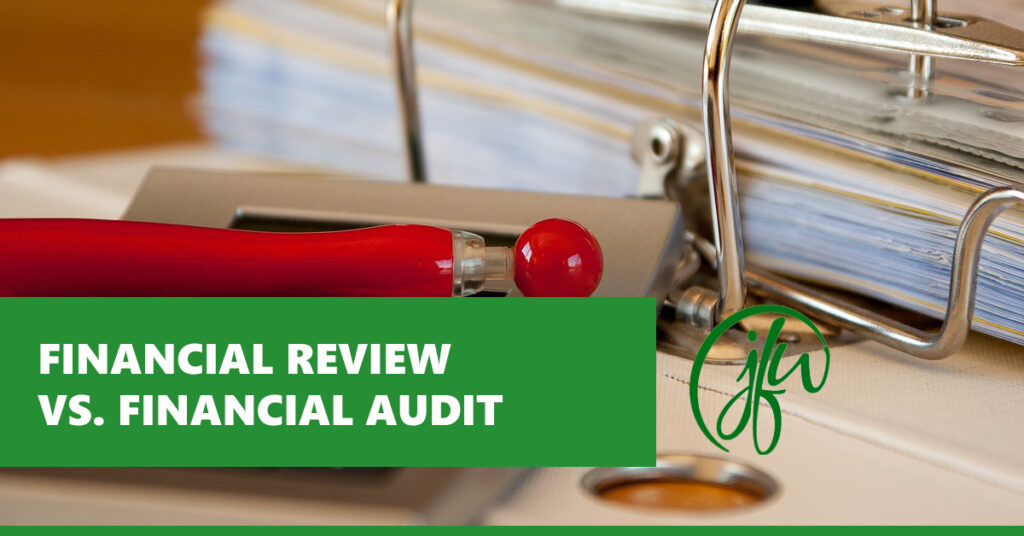In order to establish and maintain a solid understanding of the fiscal health of your business, you’ll need to periodically take a detailed look at your financial statements. There are multiple strategies for conducting these intricate deep dives, including financial reviews and audits, but what is a financial review vs. an audit?
The following breakdown will explore the two concepts, ensuring you know when to use each strategy effectively.
What Is a Financial Review?
A financial review is a less intensive examination of your financial statements and accounting records. Its goal is to provide a moderate level of assurance that your financial statements are free from material misstatement.
A certified public accountant (CPA) will typically conduct this type of analysis independently, and they usually won’t dig too deep into your financial records. Instead, they will focus on obtaining a high-level overview of your company’s fiscal health.
Here’s a closer look at what a financial review entails:
Scope
The most notable aspect of a financial review is its scope, which is somewhat limited. Your CPA will examine transaction records and account statements to better understand the company’s financial position, but they will not conduct a comprehensive analysis of all of your records. Their intent is instead to make sure that your documents are clear, accurate, and complete.
Assurance Level
Your accounting professional will be able to identify any egregious errors or gaps in your records during a review. However, they will not be able to guarantee the accuracy of financial statements due to the limited scope of the analysis.
Documentation
For a financial review, you won’t need as much comprehensive documentation as you would for an audit. Your CPA may only review recent transactions and account records. They likely won’t dig into purchase orders, accounts payable (AP), accounts receivable (AR), or other documents outside of the limited scope of their review unless they discover a serious error.
What Is a Financial Audit?
A financial audit is a thorough and detailed examination of a company’s financial statements and underlying records. Your team will provide a high level of assurance that the financial statements are free from material misstatement, whether due to fraud or error. And accounting professionals will extensively test your transactions and internal controls as part of the process.
Let’s take a closer look at the aspects of an audit:
Scope
In contrast to a financial review, an audit is one of the broadest financial analyses that you can perform. CPAs will explore the efficacy of internal controls and accounting practices and conduct a comprehensive review of all relevant documents and files to uncover errors and identify areas for improvement.
Assurance Level
Your accounting team (or external auditor) will be able to provide reasonable assurance that your financial statements are accurate while also identifying potential compliance issues.
Documentation
Auditors require significantly more documentation to perform their duties. They may need AP and AR invoices, purchase orders, account statements, and more. As such, it is vital that your files are well-organized and readily accessible to facilitate a more efficient audit process.
Financial Review vs. Audit: Key Differences
As it has been made clear, audits and reviews differ in four key areas:
Assurance Level
Financial reviews provide you with limited assurance regarding the accuracy and reliability of your records, while an audit can provide peace of mind that your statements are reliable and accurate.
Scope
Financial reviews have a narrow, focused scope. Your CPA will need to expand the scope of their document collection and analysis during an audit.
Cost and Time
If you have an in-house accountant or financial team, they can perform a review relatively efficiently and at a low cost. However, an audit can be both costly and time-consuming, especially if you outsource the process to a third party.
Frequency
You’ll typically conduct a financial review with greater frequency as a means of checking up on your organization’s cash flow and fiscal health. Audits are performed less frequently, usually once or twice per year.
Financial Review vs. Financial Audit: Which One Should You Perform?
Both audits and cursory financial reviews are important to maintaining your business’s fiscal health. Typically, you should perform reviews more frequently as a sort of “financial checkup.” However, you should periodically requisition a full-scale audit to examine the efficacy of your processes and the accuracy of your financial records. The frequency with which you conduct audits will vary based on the size and complexity of your business.
Each process offers unique benefits and levels of assurance. Consider your specific goals and business needs when choosing when and how often to perform each type of financial check.

